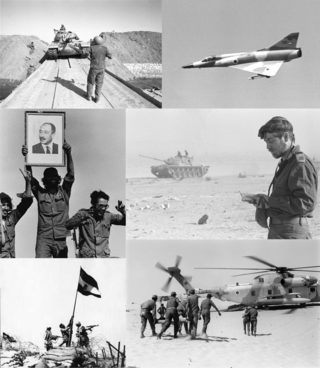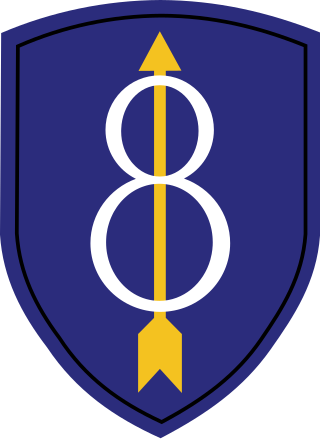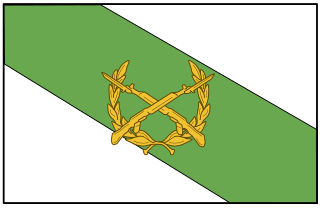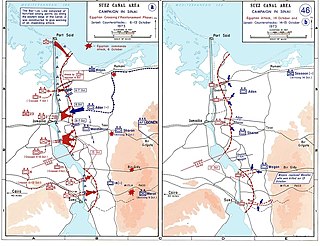
The Yom Kippur War, also known as the Ramadan War, the October War, the 1973 Arab–Israeli War, or the Fourth Arab–Israeli War, was fought from 6 to 25 October 1973 between Israel and a coalition of Arab states led by Egypt and Syria. Most of the fighting occurred in the Sinai Peninsula and Golan Heights, territories occupied by Israel in 1967. Some combat also took place in Egypt and northern Israel. Egypt aimed to secure a foothold on the eastern bank of the Suez Canal and use it to negotiate the return of the Sinai Peninsula.

Operation Badr, also known as Plan Badr, was an Egyptian military offensive and operation across the Suez Canal that destroyed the Bar-Lev Line, a chain of Israeli fortifications along the frontline of the Israeli-occupied Sinai Peninsula, on 6 October 1973. It was launched in conjunction with a Syrian military offensive against the Israeli-occupied Golan Heights, triggering the Yom Kippur War. During the War of Attrition, which preceded Operation Badr, both Egypt and Syria had been seeking to recover the territories that Israel had captured from them during the 1967 Arab–Israeli War.

The 35th Paratroopers Brigade is an Israeli military airborne infantry brigade. It forms a major part of the Israeli Ground Forces' Infantry Corps, and has a history of carrying out special operations from the 1950s onwards. Soldiers of the brigade wear maroon berets with the Infantry Corps pin and russet boots.

The 8th Infantry Division, ("Pathfinder") was an infantry division of the United States Army during the 20th century. The division served in World War I, World War II, and Operation Desert Storm. Initially activated in January 1918, the unit did not see combat during World War I and returned to the United States. Some units would serve in the American Expeditionary Force to Siberia. Activated again on 1 July 1940 as part of the build-up of military forces prior to the United States' entry into World War II, the division saw extensive action in the European Theatre of Operations. Following World War II, the division was moved to West Germany, where it remained stationed at the Rose Barracks in Bad Kreuznach until it was inactivated on 17 January 1992.

The Battle of the Chinese Farm took place during October 15 to October 17, 1973 between the Egyptian Army and the Israel Defense Forces (IDF), as part of the Yom Kippur War. It was fought in the Sinai Peninsula, north of the Great Bitter Lake and just east of the Suez Canal, near an Egyptian agricultural research station. The area was known to the Israeli military as the Chinese Farm – a misnomer resulting from the research station's use of Japanese-made equipment, with Japanese writing on the machinery mistaken by Israeli observers for Chinese characters.

The Southern Command, often abbreviated to Padam, is a regional command of the Israel Defense Forces (IDF). It is responsible for the Negev, the Arava, and Eilat. It is currently headed by Yaron Finkelman.

The 7th Mechanized Division was a mechanized infantry division of the Syrian Arab Army. It was established in 1970. The division was part of the Syrian Army's 1st Corps.

The Battle of the Sinai was one of the most consequential battles of the Yom Kippur war. An Egyptian attacking force that advanced beyond their line of defense at the Bar-Lev Line was repulsed with heavy losses by Israeli forces. This prompted the Israelis to launch Operation Abiray-Lev the next day, penetrating the Egyptian line of defense and crossing the Suez Canal.
On 25 March 1971, the Pakistani military, supported by paramilitary units, launched the military operation to pacify the insurgent-held areas of East Pakistan, which led to a prolonged conflict with the Bengali Mukti Bahini. Although conventional in nature during March–May 1971, it soon turned into a guerrilla insurgency from June of that year. Indian Army had not directly supported the Bengali resistance but had launched Operation Jackpot to support the insurgency from May 1971.

The Battle of Ismailia took place between the Egyptian Army and the Israeli Defense Forces (IDF) during the last stages of the Yom Kippur War during October 18–22, 1973, south of the city of Ismailia, on the west bank of the Suez Canal in Egypt. The battle itself took place as part of the larger IDF-launched Operation Abiray-Lev, in an attempt to seize Ismailia and thereby sever the logistical and supply lines of most of Egypt's Second Field Army across the Suez Canal.

The 5th Mechanized Division was a mechanized infantry division of the Syrian Arab Army. The division waspart of the Syrian Army's 1st Corps.
This is the order of battle for the Six-Day War between Israeli forces and Arab forces which consisted of Syrian, Egyptian, and Jordanian military forces. The war took place on June 5–10, 1967.
The Second Field Army is a military formation of the Egyptian Army, formed in 1968. Army headquarters is at Ismailia. It is usually commanded by a field commander of lieutenant-general rank of at least 34 years' service, and reports directly to the Army General Headquarters and General Staff.

El-Sa‘ka Forces is an Egyptian military commando force established in 1955 by Major General Jalal Mahmoud Fahmy Al-Haridi. High fitness is required and training is conducted at the El Sa‘ka Academy built by Major General Ahmed Ragai Ateya. Unit 777 and Unit 999 are divisions of the Sa'ka forces.
This is the order of battle of the German, Greek and British Commonwealth units on 5 April 1941, prior to the German invasion of Greece and Yugoslavia. The German invasion and conquest of mainland Greece is known as the "Battle of Greece".

The Western Military Region is one of the five military regions of the Egyptian Armed Forces and is headquartered in Marsa Matrouh.

The Third Field Army is a field army of the Egyptian Army, with its headquarters in Suez. It is now part of the Unified Command of the area east of the canal (Egypt).

Operation Abirey-Halev or Operation Abirey-Lev also known as Operation Stouthearted Men and Operation Valiant, code-named Operation Gazelle, was an Israeli operation that took place in the center of the Suez Canal on 15–23 October 1973 during the Yom Kippur War.

The 1st Corps was a corps of the Syrian Army that was first formed in 1985. Richard Bennett wrote in 2001 that "three corps [were] formed in 1985 to give the Army more flexibility and to improve combat efficiency by decentralising the command structure, absorbing at least some of the lessons learned during the 1982 Lebanon War." He said that the 1st Corps covered southern Syria, in particular the heavily fortified defense zone between Damascus and the Golan Heights and south to Daraa near the border with Jordan. On 29 December 2022, Major General Suhail Asaad was appointed as commander of the 1st Army Corps of the Syrian Arab Army.

The 252nd "Sinai" Division is an Israel Defense Forces reserve division under the Southern Command. Formed in 1968, it was the first permanent division in the IDF. As of August 2024, it is commanded by Brigadier General Yehuda Vach.















